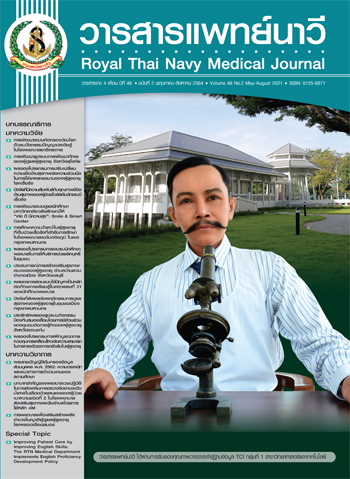การพยาบาลเพื่อเสริมสร้างพลังอำนาจในญาติผู้ดูแลผู้สูงอายุโรคหลอดเลือดสมอง
Main Article Content
บทคัดย่อ
การดูแลผู้สูงอายุโรคหลอดเลือดสมอง ญาติเป็นบุคคลที่มีบทบาทสำคัญในการช่วยเหลือกิจวัตรประจำวัน ช่วยเหลือฟื้นฟูเพื่อป้องกันภาวะแทรกซ้อนต่างๆ รวมทั้งการดูแลด้านจิตใจและอารมณ์ของผู้สูงอายุโรคหลอดเลือดสมองอย่างใกล้ชิดอยู่ตลอดเวลา ด้วยระยะเวลาการดูแลที่ต่อเนื่องและยาวนาน ทำให้เกิดผลกระทบต่อผู้ดูแลทั้งทางด้านร่างกาย จิตใจ อารมณ์ สังคม และเศรษฐกิจ โดยเฉพาะความเครียดและความเหนื่อยล้าจากการดูแลที่สะสมเป็นเวลานาน อาจทำให้ญาติผู้ดูแลรู้สึกถึงพลังที่ถดถอยหรือหมดพลังอำนาจในการดูแลตนเองและผู้สูงอายุ ดังนั้นญาติผู้ดูแลจึงจัดว่าเป็นกลุ่มบุคคลที่ไม่ควรมองข้ามและควรได้รับการดูแลช่วยเหลือเพื่อให้เกิดคุณภาพชีวิตที่ดี
บทความนี้มีวัตถุประสงค์เพื่อนำเสนอการพยาบาลเพื่อเสริมสร้างพลังอำนาจของญาติผู้ดูแลผู้สูงอายุโรคหลอดเลือดสมอง โดยประยุกต์ใช้รูปแบบการเสริมสร้างพลังอำนาจของ Gibson (Gibson’s Empowerment Model) ประกอบด้วย 4 ขั้นตอน ได้แก่ 1) การค้นพบความจริง 2) การสะท้อนคิดอย่างมีวิจารณญาณ 3) การตัดสินใจเลือกวิธีปฏิบัติที่เหมาะสม และ 4) การคงไว้ซึ่งการปฏิบัติที่มีประสิทธิภาพ โดยทั้ง 4 ขั้นตอนจะช่วยให้ญาติผู้ดูแลเกิดความเชื่อมั่นในตนเอง สามารถพัฒนาศักยภาพที่มีอยู่ในตัว รับรู้ถึงพลังอำนาจในตนเอง ส่งผลให้เกิดการพัฒนาศักยภาพการดูแลผู้สูงอายุโรคหลอดเลือดสมองให้มีประสิทธิภาพมากยิ่งขึ้น
Article Details

อนุญาตภายใต้เงื่อนไข Creative Commons Attribution-NonCommercial-NoDerivatives 4.0 International License.
เอกสารอ้างอิง
Williams S, Murray C. The lived experience of older adults' occupational adaptation following a stroke. Australian Occupational Therapy Journal 2013;60(1):39-47.
Sihapark S, Chuengsatiansup K, Tengrang k. The effect and caregiving burden of older person in long-term care based on Thai culture. Nonthaburi: Health Systems Research Institute; 2014. (in Thai).
Tsai PC, Yip PK, Tai JJ, Lou M. Needs of family caregivers of stroke patients: a longitudinal study of caregivers’ perspectives. Patient Prefer Adherence 2015;9:449-57.
Ounnapiruk L. Geriatric nursing: nervous system. Bangkok: Boonsiri Printing; 2010. (in Thai).
Promvises P, Lapvongwatana P, Chansattiporn N, Jirapongsuwan A, Sanpakit K. Effects of the caregiver’s empowerment program on home care for preschool children with leukemia. Journal of Public Health Nursing 2013;27(1):88-101. (in Thai).
Gibson CH. The process of empower in mother of chronically ill children. Journal of Advanced Nursing 1995;2:1201-10.
Eliopoulos C. Neurologic function. 8th ed. Philadelphia: Lippincott; 2014.
Touhy TA, Jett KF. Theories and physical changes of aging. 3rd ed. Missouri: Elsevier; 2010.
Petchroung N, Priyatruk P, Thongkeang V. The study of continuing care for patients with cerebrovascular disease in primary care unit. Journal of The Royal Thai Army Nurses 2013;14(1):25-34. (in Thai).
Suntayakorn C. Care management for stroke in community: concept and community nurse experience. Phitsanulok: Trakoonthai Printing House Limited Partnership; 2011. (in Thai).
Puwarawuttipanit W. Comprehensive caring stroke patients. Bangkok: N P Press Limited Partnership; 2009. (in Thai).
Suttupong C, Sindhu S. Predicting factors of depression in older people post-stroke in Urban communities. Journal of Nursing Science 2012;30(1):28-39. (in Thai).
Kasemkitwattana S, Prison P. Chronic patients’ family caregivers: a risk group that must not be overlooked. Thai Journal of Nursing Council 2014;29(4):22-31. (in Thai).
Chayawatto C. Depression in the caregivers of stroke patients. Region 4-5 Medical Journal 2016;35(1):14-27. (in Thai).
Jones PS, Winslow BW, Lee JW, Burns M, Zhang XE. Development of a caregiver empowerment model to promote positive outcomes. Journal of Family Nursing 2011;17(1):11-28.
Hanh PT, Jullamate P, Piphatvanitcha N. Factors related to caregiver burden among family caregivers of older adults with stroke in Hai Duong, Vietnam. The Southern College Network Journal of Nursing and Public Health 2017;4(3):45-62.
Vellone E, Fida R, Cocchieri A, Sili A, Piras G, Alvaro A. Positive and negative impact of caregiving to older adults: a structural equation model. Professioni Infermieristiche 2011;64(4):237-48.
Suwannimitr A. Primary care nursing and community empowerment. Mahasarakham: Apichart Printing; 2010. (in Thai).
Poomsanguan K. Health empowerment: nurses’ important role. Journal of The Royal Thai Army Nurses 2014;15(3):86-90. (in Thai).
Gibson CH. A concept analysis of empowerment. Journal of Advanced Nursing 1991;16(3):354-61.
Rafael ARF. Advocacy and empowerment: dichotomous or synchronous concepts?. Advances in Nursing Science 1995;18(2):25-32.
Wongpanarak N. The therapeutic relationship: application in nursing process. Journal of The Royal Thai Army Nurses 2014;15(2):84-91. (in Thai).
Yimyam N, Rodjarkpai Y. Effect of empowerment program of caregiver caring for the elderly at risk of high blood pressure in Kaengdinso sub-district, Nadee district, Prachinburi province. Journal of the office of DCP 7 Khon Kean 2017;24(2):46-58. (in Thai).
Takpho A, Somprasert C, Imkome E. The effects of a self-help group program on the mental health self-care of schizophrenic patients’ primary caregivers. Journal of Nursing and Health Care 2017;35(3):109-19. (in Thai).
Boonyara J, Uppanisakorn S. Spiritual care for critically ill patients and families in ICU: nursing experiences. Princess of Naradhiwas University Journal 2012;4(1):1-13. (in Thai).
Miller WR, Rollnick S. Motivation interviewing: preparing people to change addictive behavior. New York: Guilford Press; 2002.
Aiumwan P, Jitpanya C. Therapeutic nursing intervention on activity of daily living in patiens: a meta analysis. Royal Thai Navy Medical Journal 2017;42(2):73-92. (in Thai).
Boise L, Congleton L, Shannon K. Empowering family caregivers: the powerful tools for caregiving program. Educational Gerontology 2005;31(7):573-86.


